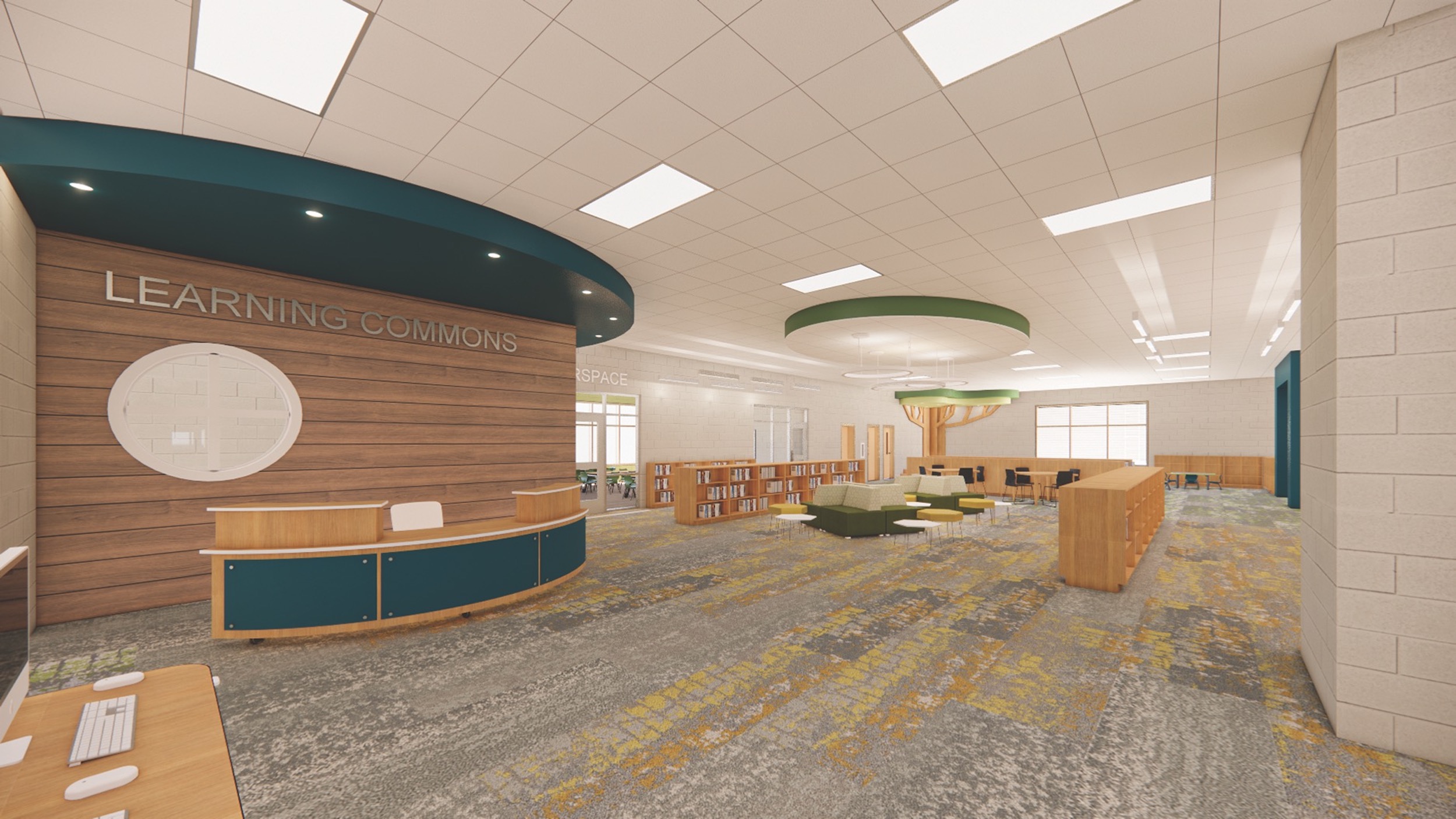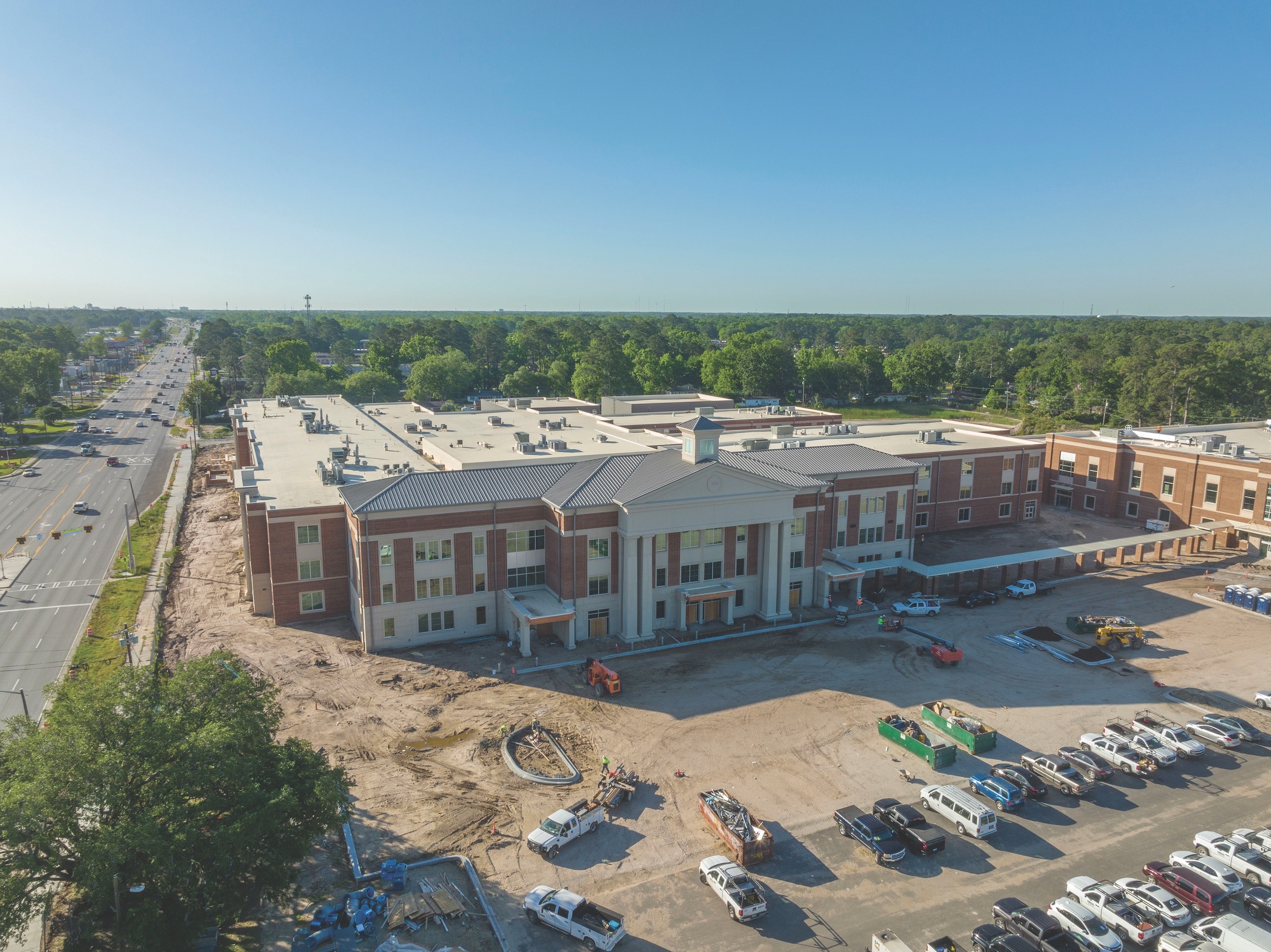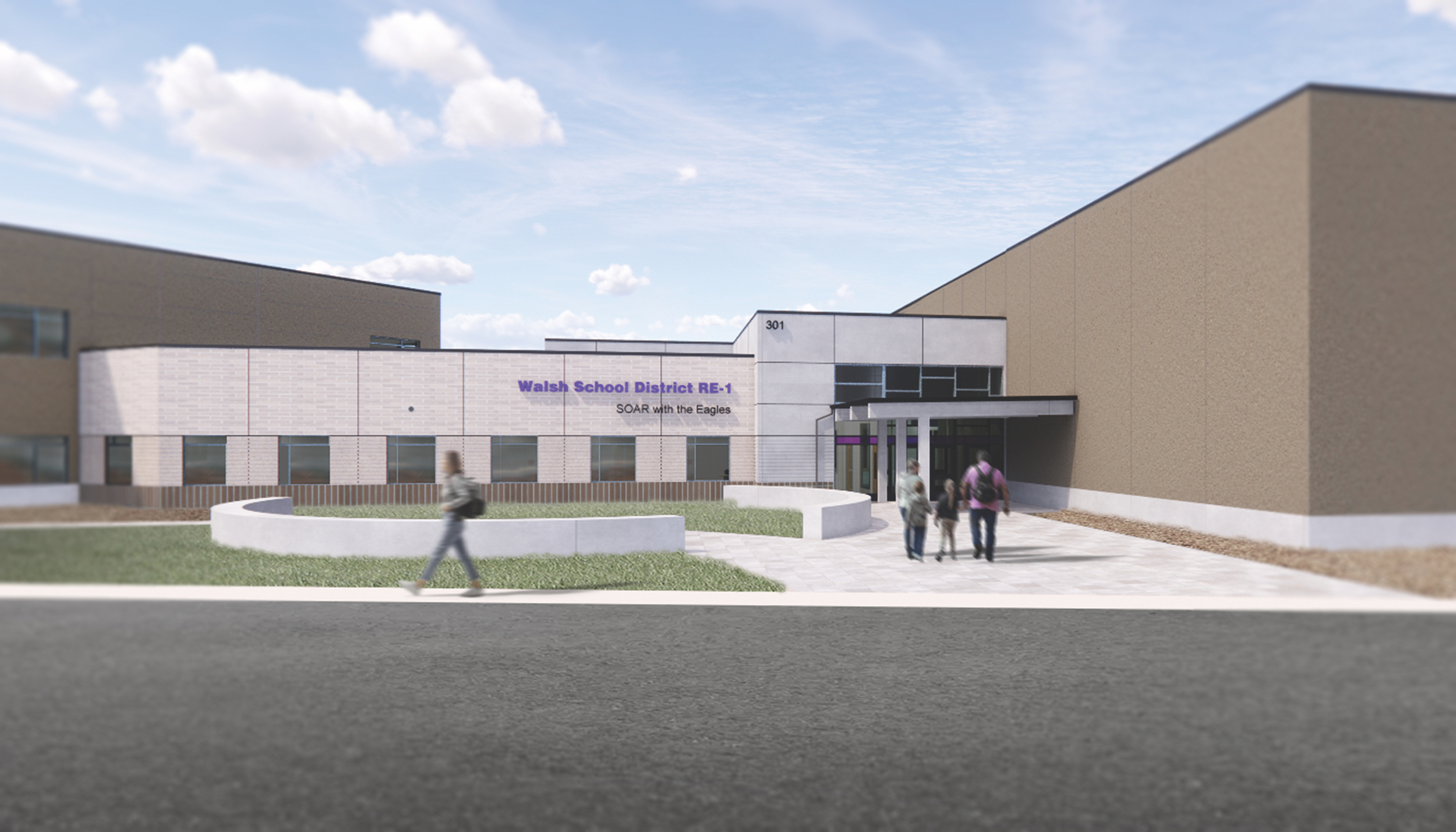In late March, Walsh School District in rural Colorado started construction on a 60,000-sf school that, when completed in the spring of 2024, will teach students in grades Pre-K through 12 under one roof.
In Georgia, the Savannah-Chatham County Public School System (SCCPSS) is wrapping up construction on a 410,000-sf K-12 multi-school project in Garden City, near Savannah, that will enroll about 2,400 students.
While corralling elementary, middle, and high school students in one building isn’t unheard of, it’s still more the exception than the rule, and controversial as news about bullying in schools has become more frequent. “If anything, more schools are separating grade levels,” observes Chris Greer, Henderson Engineers’ K-12 Education Practice Director.
A few years ago, JCJ Architecture designed a one-building K-12 school for a district in Rochester, N.Y. But, says Jim LaPosta, the firm’s Chief Architectural Officer, the prevailing single-building model remains K-8.
However, that could be changing. The general contractor Barton Malow has been working with the Kresge Foundation and the University of Michigan to build PK-16 schools in Detroit. (At least one is under construction, says Mike Stobak, the firm’s Vice President of its K-12 Group.)
The Savannah K-12 school is part of a larger trend toward school building consolidation, in Georgia and other states, asserts David Hamilton, Vice President and Regional Manager for Charles Perry Partners, the general contractor on the Garden City project, whose “all-in” cost is $135 million, according to Dr. Slade Helmly, SCCPSS’s project manager.
Phase 1 of this project, which will be completed this summer, includes two gyms, two cafeterias, and a common kitchen. The school will feature a digital media lab, career and technical education programs for aviation, logistics, and business, a two-story, 750-seat auditorium, and a parking lot with at least 660 spaces. Phase 2 went out for bid in May, says Helmly, and encompasses a fieldhouse and stadium, and campus police department. (The old police station had been on this site, as was Gross High School, both of which were demolished.)
A 50-kW solar array on the new building’s roof will supply one-third of the school’s energy needs.
Addressing security concerns in single-building K-12 schools
Vaughn Dierks, a Partner with Wold Architects & Engineers, which is the Project Architect on the Walsh School District’s PreK-12 school, says that having students of all grades in one building isn’t that big of a deal for this mountain community, where “the kids ride the same bus together, and the older kids look after the younger ones.”
Hamilton thinks that SCCPSS and LS3P Associates—which designed the Garden City school and hired the engineers and contractor for the building team—did a good job separating the lower and upper grades via glass partitions and access-control doors.
April Mundy and Lisa Pinyan, LS3P’s Project Architect and Senior Project Manager/Interior Designer, tell BD+C that their firm designed this campus as three buildings—a primary, middle, and high school—that “share a few common walls.” Administration and student services are strategically located in multiple locations throughout the building, which helps to delineate zones, supervision, and security.


ambitious project as reinforcing the local community. Graphics: LS3P Associates
The idea behind the single-building K-12 school, they explain, is rooted in three basic tenets:
• Improving the educational experience by allowing the administration to adjust classroom grade assignments as enrollment ebbs and flows each year. This environment should also enhance professional development and cross collaboration, and provide more varied learning to students;
• Sharing common core programs and spaces that include specialized arts and performance venues, career education, athletics, and food services; and
• Improving security and operations with centralized systems, so infrastructure can be more efficient by serving a larger student population. Each phase of the building’s design followed Crime Prevention Through Environmental Design (CPTED) principles.
Mundy and Pinyan add that by having the grades together, “we’re able to create a hub and city center for local families to drop off and pick up their children. The goal is for this school to be a catalyst to build a strong community.”
Will single-building K-12 schools become a niche?
This is SCCPSS’s largest project to date, as well as the largest school project undertaken by Charles Perry Partners. “There’s a huge difference between building a $30 million K-8 school and a $100 million K-12 school,” says Hamilton. “It’s a different level of construction.” He’s a big believer in superintendents owning their areas of responsibility, so on this project, his firm brought on board assistant supers with specialties in MEP, exteriors, and so forth. “It was like building a mini company.”
Hamilton says his firm hopes to parlay the Georgia K-12 multi-school building into more multi-school business. “We are definitely showcasing this project, because people want to work with builders that have been there, and have the T-shirt.”
Related Stories
| Aug 11, 2010
Cherokee Nation center employs eco-friendly features
Three new schools for K-12 students are the focus of a $108 million, 473,000-sf Cherokee Nation multipurpose complex based in Cherokee, N.C. Designed by Padgett & Freeman Architects and built by BE&K Building Group, the center was designed to reflect the art and heritage of the Cherokee people, evidenced by the seven-sided shape of the two courtyard areas and traditional basketweave pat...
| Aug 11, 2010
Replacement school puts old school's materials to good use
Replacing an existing school in the University School District near St. Louis, Mo., the new Barbara C. Jordan Elementary School will accommodate up to 500 students in 24 classrooms. The $13 million school spans 64,834 sf and will use recycled elements from the old building, including mosaic tiles from water fountains, an entryway tile mural, and a freestanding masonry bench.
| Aug 11, 2010
Hillside school sports exciting shape
An education facility for 1,200 students and 300 teachers will grace a hillside in the Faroe Islands town of Torshavn. The 19,200-sm Faroe Islands Education Centre, designed by Copenhagen-based Bjarke Ingels Group, will have a panoramic view overlooking the sea, mountains, and harbor. The building's vortex shape radiates toward its surroundings while drawing attention to the center of the school.
| Aug 11, 2010
New Union City school to use remnants from old building
With 35 classrooms, a media center, science labs, and music rooms, Columbus Elementary School #3 in Union City, N.J., is being built on a confined site, so designer RSC Architects, in conjunction with HOK, will implement underground parking and a rooftop playground. RSC Architects also salvaged classical porticos from a former school at the site; they will be reused to create dramatic entryways...
| Aug 11, 2010
High-density planning allows abundant open space
Gilroy Unified School District's new Christopher High School in California opened its first phase this fall. The 1,800-student, 231,000-sf facility was designed with a high-density site plan that allows for both on-site sports fields and undeveloped open space. BCA Architects of Fremont, Calif., with Gilbane Building Companies as CM, collaborated with numerous user groups to plan the two-story,...
| Aug 11, 2010
And the world's tallest building is…
At more than 2,600 feet high, the Burj Dubai (right) can still lay claim to the title of world's tallest building—although like all other super-tall buildings, its exact height will have to be recalculated now that the Council on Tall Buildings and Urban Habitat (CTBUH) announced a change to its height criteria.
| Aug 11, 2010
Courtyard connects new and remodeled schools
Good Fulton & Farrell Architects of Dallas designed a major expansion and renovation at the Dallas Academy in Texas. The 22,900-sf addition serves as the school’s new front door and includes a library, student assembly area, cafeteria, seven classrooms, and administrative offices. The school’s existing 14,560-sf building was renovated to accommodate a lower school component, and...
| Aug 11, 2010
Connecticut high school gets a expansion and renovation
The Morganti Group, Danbury, Conn., is managing the construction of a $41 million addition and renovation project at Newtown (Conn.) High School. Designed by Fletcher Thompson, Shelton, Conn., the project consists of a 70,000-sf addition and 30,000 sf of renovations to the gymnasium and interior spaces.
| Aug 11, 2010
School district plans net-zero building
Camas (Wash.) School District is planning to utilize one of three energy sources—photovoltaics, wind turbine, or geothermal—to help take its new community high school completely off the grid. The school district commissioned Interface Engineering to explore all three options for the project, which is scheduled to break ground in August.
| Aug 11, 2010
LA high school takes design cue from historic Mexican architecture
The Los Angeles Unified School District recently opened the $75 million Felicitas and Gonzalo Mendez Learning Center, a high school in the Los Angeles neighborhood of Boyle Heights, near Little Tokyo. Designed by Nadel Architects in a joint venture with Barrio Planners Inc., the 114,000-sf school is vertically integrated, allowing the campus to fit on a compact, six-acre site.







